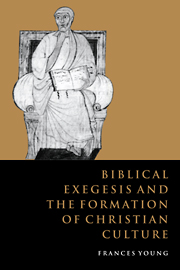Book contents
- Frontmatter
- Contents
- Preface
- List of abbreviations
- Introduction
- PART I EXEGESIS AND THE UNITY OF THE SCRIPTURES
- 1 Reception and appropriation
- 2 The mind of scripture
- PART II THE BIBLE AS CLASSIC
- PART III LANGUAGE AND REFERENCE
- PART IV THE BIBLE AND THE LIFE OF FAITH
- Conclusion and retrospect: towards an outline historical account
- Bibliography
- 1 Index ofbiblicaI references
- 2 Index of modern scholars
- 3 Index of subjects
1 - Reception and appropriation
Published online by Cambridge University Press: 02 December 2009
- Frontmatter
- Contents
- Preface
- List of abbreviations
- Introduction
- PART I EXEGESIS AND THE UNITY OF THE SCRIPTURES
- 1 Reception and appropriation
- 2 The mind of scripture
- PART II THE BIBLE AS CLASSIC
- PART III LANGUAGE AND REFERENCE
- PART IV THE BIBLE AND THE LIFE OF FAITH
- Conclusion and retrospect: towards an outline historical account
- Bibliography
- 1 Index ofbiblicaI references
- 2 Index of modern scholars
- 3 Index of subjects
Summary
By ‘reception and appropriation’ I mean the exegetical process whereby readers make the text their own.
According to scholarly tradition, ‘reception’ of the biblical material in the early Church has been studied through the search for allusion and quotation. Debate has centred on the question whether such material evidences oral tradition or knowledge of particular documents, especially in relation to the reception of Christian-authored texts. If knowledge of particular documents is claimed, then the issue of the status accorded to them becomes important, and so, in the case of Christian-authored documents, the process of reception is associated with the formation of the canon in most modern scholarship. The assumption has been that the canonical process was one in which Christian-authored documents were gradually lifted to the same inspired status as the inherited Jewish ones. The reception and appropriation of the Jewish scriptures has usually been taken for granted. True, questions have been raised about which scriptures, and to what extent they were mediated through memory or testimony-books. But the assumption that Christians inherited a canon to which they then added their own literature meant that there was nothing surprising in Origen's adoption of the Jewish traditions that every jot and tittle mattered, or that inspired texts could be interpreted by means of other inspired texts. Thus, the unity and inerrancy of the Bible, however problematic for modern scholars, have been taken to be, for the early Church, unsurprising dogmas.
- Type
- Chapter
- Information
- Publisher: Cambridge University PressPrint publication year: 1997
- 1
- Cited by



